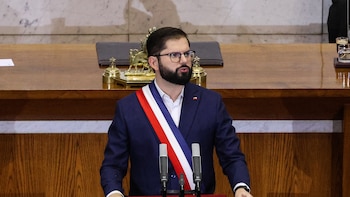
More than fifteen stalls in the 'Santa Rosa' shopping center in Los Olivos district were dismantled by a group of criminals in a single night. The thugs acted with great speed and were caught on security cameras.
The thieves entered through one of the windows on the second floor. Thus, they first entered a restaurant and, moving tables and chairs, they took away the televisions that were on the premises and the money collected on the day.
Then, they went down to the first floor and broke the locks of the other premises. Thus, they took both the newly purchased merchandise and the money collected. Some merchants pointed out that they took the money used to pay the rent. At dawn, some stalls were still open, just as the evildoers left them.
Traders are suspicious of people close to them or to the mall, as the robbery took place quickly and had clearly been planned. Therefore, they ask the authorities to identify these wrongdoers, since they will have to start from scratch to be able to replace what was stolen and continue working despite the insecurity.
The crime wave is being experienced even though there is a curfew in Lima and Callao. This was first applied on February 2, but has since been expanded.
WHAT IS A STATE OF EMERGENCY?
This is a constitutional measure that can be decreed by the President of the Republic, with the agreement of the Council of Ministers and must only be for a certain period of time. You can apply for the entire national territory or to a single specific sector.
It is declared when there is “disturbance of peace or internal order, catastrophe or serious circumstances affecting the life of the Nation”. Article 137 of the Constitution states that it cannot exceed 60 days and, if required, is extended by a new decree.
During the period set for Lima and Callao, constitutional rights are suspended:
Right to liberty: subjects of rights may engage in any kind of activity, which involves the exercise of other fundamental rights other than freedom, as long as they do not violate with it the norms that make up public order, good customs and those that are imperative in nature.
Inviolability of domicile: Rights subjects may prevent any other person from entering their home to carry out investigations, searches or other grounds if they do not authorize it or when third parties do not have a court order. They may not prevent it, however, in the event of a flagrante delicto or very serious danger of its perpetration.
Freedom of assembly: Subjects of rights may group, congregate or assemble, without prior notice, both in private places and open to the public as long as they do so peacefully. On the contrary, meetings in public places or roads require advance notice to the authority, which may prohibit them only for proven reasons of safety or public health.
Freedom of transit within the national territory: The subjects of rights, in principle, can move freely, within the national territory in which they have their domicile and also outside it, which implies being able to choose where to live. Except for health reasons or by court order or by application of the Aliens Act.
Últimas Noticias
Debanhi Escobar: they secured the motel where she was found lifeless in a cistern
Members of the Specialized Prosecutor's Office in Nuevo León secured the Nueva Castilla Motel as part of the investigations into the case

The oldest person in the world died at the age of 119
Kane Tanaka lived in Japan. She was born six months earlier than George Orwell, the same year that the Wright brothers first flew, and Marie Curie became the first woman to win a Nobel Prize

Macabre find in CDMX: they left a body bagged and tied in a taxi
The body was left in the back seats of the car. It was covered with black bags and tied with industrial tape
The eagles of America will face Manchester City in a duel of legends. Here are the details
The top Mexican football champion will play a match with Pep Guardiola's squad in the Lone Star Cup

Why is it good to bring dogs out to know the world when they are puppies
A so-called protection against the spread of diseases threatens the integral development of dogs




